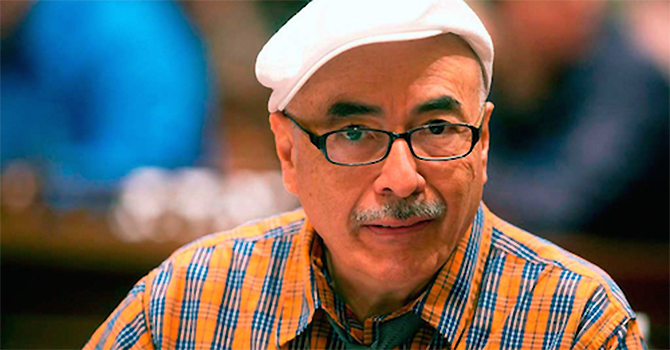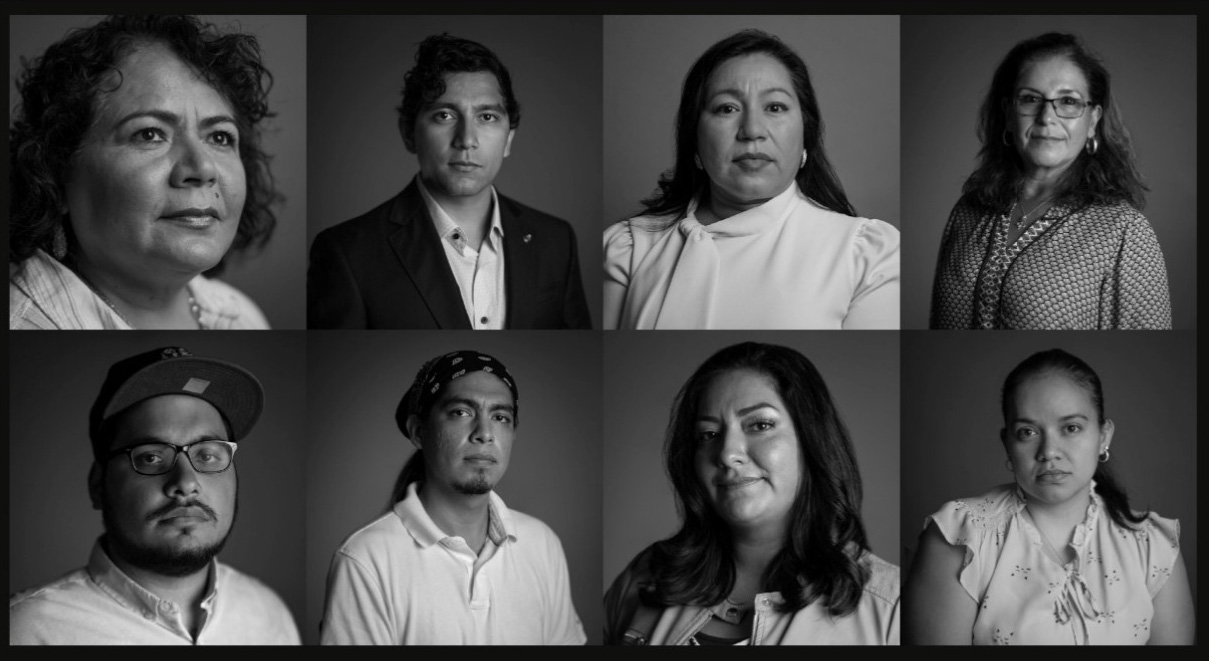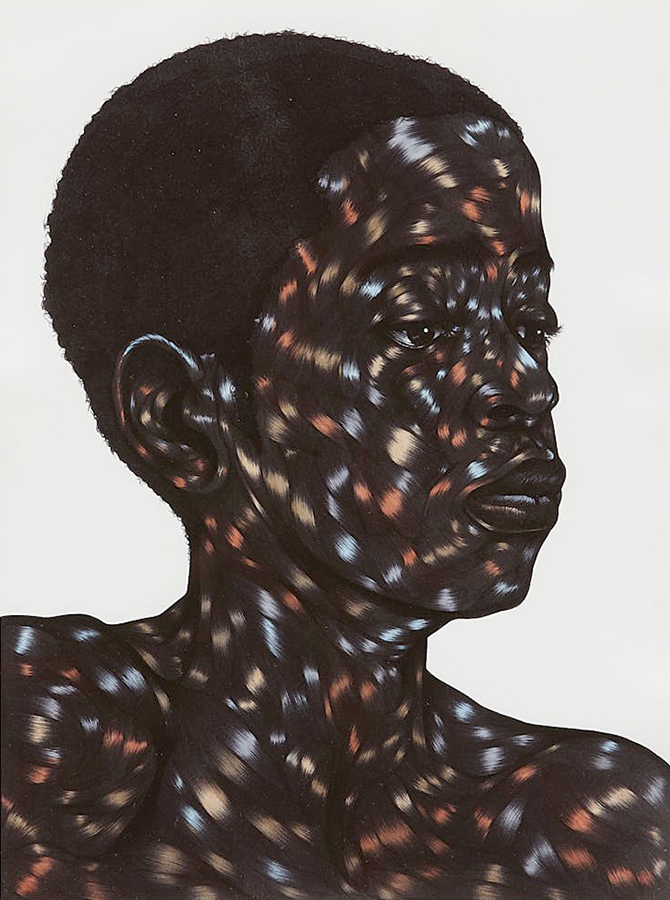Juan Felipe Herrera’s life and work is marked by border crossing, both literal and metaphorical.
Herrera, who is in his second term as U.S. poet laureate, has published more than a dozen collections of poetry, in addition to short stories, young adult novels and children’s books.
He also is a teacher, performance artist and activist, and he brings that spirit to his national role as an advocate for writing and creative expression.
“If you have something to say that you’re really moved by -- you feel pain, you see people suffering -- you must speak, you must write, and you must express yourself,” Herrera said.
“Compassion and kindness are really made out of action. They’re not just thoughts or feelings; we have to act on them. And my role is to encourage people to create and express themselves with words.”
Herrera’s work is heavily influenced by his childhood in California as the son of Mexican farm workers and by the Chicano movement of the 1970s, when he was a student at UCLA.
Before he was appointed U.S. poet laureate in 2015, Herrera served as the poet laureate of California. In 2016, he received the Robert Kirsch Award for lifetime achievement at the 36th annual L.A. Times Book Prizes.
His book “Half the World in Light: New and Selected Poems” won the National Book Critics Circle Award and the International Latino Book Award.
He spoke to Faith & Leadership while at Duke for a public reading sponsored by Duke’s Program in Latino/a Studies in the Global South, the Office of the Provost, the Office of the Dean of Arts & Sciences, and the Department of Romance Studies. The following is an edited transcript.
Q: How do you see your leadership role as poet laureate?
The way I see the poet laureate position is to encourage others to have a great creative experience and to express themselves.
It’s a very simple statement. Yet it’s such a challenge to really touch base with who you are and acknowledge your voice, finding out what that is and unleashing it, and then finding a way to focus your voice for the betterment of everyone.
Q: Many of your projects have to do with children, including “The Technicolor Adventures of Catalina Neon,” a collaborative poem written with submissions from second- and third-grade children across the country. Talk about that collaboration and your focus on children.
Well, my attitude toward children is to encourage them. They are often left behind, or they’re cut away from the writing world, because the humanities are limited in our schools K-12. It seems that every day we have sparser resources for the humanities -- arts and music, dance and creative writing.
What I want to do is encourage the new generation to see themselves as authors and writers, to value words and everything that writing is -- imagination and creativity -- and to become a generation of new writers for all of us.
Also, I want to have children’s second-grade, third-grade life come to all of us through [their submissions to this project on] the Library of Congress website. So it’s kind of a double purpose.
It’s also to encourage the rest of us that are going to look at the book written collectively to notice the amazing, magnificent, new imagination that our children have.
Q: One of the hallmarks of your work has been border crossing. What is important about this aspect of your biography and your work?
I believe in presenting my family’s experience to the public, because I think so many of us don’t really know what the migrant experience is. So we don’t really know who we are as a people, as a nation.
The 21st century is a century of border crossing under extreme circumstances. So we have to be aware of that so we can offer our assistance, our understanding, our kindness instead of our brutal forces that we have at hand that push people back, separate them and put them in detention centers.
At the level of art, it’s also the 21st century where communication and social networking and art itself is a hybrid experience that includes many things, many styles, many voices. There are many ways of going about it.
Q: What do you hope people get from this hybrid, cross-border, multimedia approach?
I hope they get a closer look at what’s going on, at least from my own limited perspective -- my experience and the rest of the Latina/Latino experience.
I also enjoy making language move. It’s not a static thing. It’s not just on a page; it’s not just in one language; it’s not just in one logical sequence. It’s like our life.
Language is life, so the closer we get to life itself, the bigger life we will have. The more in touch we will be with this thing called life, as opposed to a strict, narrow definition of everything that we think about and everything that we encounter and every person that we meet.
We’re all dynamic. And life is dynamic. The more we include it in these many, varied ways, the more human we will become -- and therefore, the more we can give to others.
Q: You write in Spanish and English -- sometimes in the same poem. Why?
Well, that’s our experience. Our home language -- whether it’s in English, a whole different dialect of English, in Spanish or Tagalog or Chinese -- it’s good to bring those languages out.
We need to bring our home lives and home styles and home expressions, as far as we can, throughout society. That way we will be a more interesting society, a more amazing society.
For me, the turn to writing bilingually came about after the Civil Rights Act passed in 1964. In 1968, I was in the university, and we were all excited, especially as Chicanos and Latinas and Latinos.
We were excited in affirming who we were -- bringing our home experience and language and styles into our writing and self-expression. That’s how we really function.
Even English, as you know. For example, the word “chocolate” comes from the Aztec word “xocoatl,” and “algebra” comes from “al-jabr,” the Arabic word. So even in English we have many languages -- it cannot be stopped.
We live in a river of humanity that has many currents. So I acknowledge that, and I have a lot of pleasure doing that.
Q: You’re in an interesting role as the poet laureate, representing the U.S. How do you see the results of the election affecting your work?
Every time we have a new president, we have kind of a new United States in some ways; new communities are reinforced, and others are thinking about it, so it’s good. It’s good. Everything is positive for us.
Sometimes you think it’s [either] positive or negative, but it really is positive, because even if we feel things are not going well for us, they will eventually become positive, because we will reflect, we will act, and we will respond.
It’s just like a society. That’s what a society does; that’s what human beings do. We don’t remain static. Otherwise, we die. There’s no growth; there’s no evolution. So yes, I’m inspired.
Everyone is feeling a lot of things, and one of the things I really like to do is to listen to people and to observe what’s going on and to respond.
I’m not going to be accurate. I’m not going to have the absolute image of what’s taking place, but I am going to have my experience and my literary love for words, so I’m going to write.
Q: It’s interesting that you say things are positive, given the rhetoric of the election about Mexican immigrants. Do you have concerns?
Anti-immigrant rhetoric has been alive for many decades. My comments on the election? I don’t have any.
But my comments on the treatment of migrants and border crossers are pretty deep. It’s my experience, my family’s experience and the experience of so many people that are working so hard just to support their family.
My concerns are actually already expressed in my poetry, and things haven’t really changed.
Since I was a child, when I was 5 years old, I’ve seen friends pulled out of their houses and put into green vans, and their parents, never to be seen again, to be deported.
So it’s not just 2016. I say that because, as you know, the migrant without papers or documents still works in the United States. Wherever we go, there’s a migrant working at either zero pay or extremely low pay, no benefits, no promotions, no advancement -- and a lot of abuse. And sexual abuse for women.
I have interviewed amazing people now in their late 90s, women who have told me their stories of when they were teenagers, how they had to work in the garment factory in El Paso, Texas, and lived in Juárez and Chihuahua, right next to the border of Mexico and Texas.
Back then, they were already suffering abuse, sexual abuse and personal attacks, just trying to cross the border at night to work cutting pockets for pants.
Q: I can’t decide whether I think that’s an optimistic or a pessimistic view.
I don’t have fixed views. Again, my role as a poet laureate of the United States is to encourage people to express themselves creatively. If you have something to say that you’re really moved by -- you feel pain, you see people suffering -- you must speak, you must write, and you must express yourself.
You can do it directly. You can do it creatively. You can do it in a group. You can write about it in your personal journal.
At least get it out of your system and reflect on what’s going on.
Otherwise, we’ll just be walking down the street seeing a lot of suffering and feeling guilty. We need to really respond, and when we do that, it’s a positive thing, and we can contribute.
We have millions of human beings being exploited and millions of human beings living segregated lives in the United States, living in compounds and never able to get out. All they get is a ride in a bus to Wal-Mart to buy [a little food] and soap, and maybe a shirt or shoes, and then they’re hauled back in a bus to their segregated workplace in very harsh conditions.
When we really think about that, we see that we need to speak up and write and have compassion and kindness -- and compassion and kindness are really made out of action. They’re not just thoughts or feelings; we have to act on them. And my role is to encourage people to create and express themselves with words.
Q: How do you blend the roles of artist and activist?
All of us can be activists in our own way -- whether it’s by teaching our children, whether it’s by marching in the streets, whether it’s by writing a blog or article or newspaper or a zine on the computer, or having social networks and communicating what’s going on, or creating particular demonstrations. Or simply writing a poem.
When we write a poem, maybe no one is going to read it. Or maybe that poem is going to reach the hands of people that really need to read that poem and feel like someone supports them.
Do not let yourself think you cannot contribute. Whatever you do, in whatever manner you can, it’s activism if it’s for others and the benefit of their lives.
Q: Did you grow up in the church?
I grew up in the Catholic Church. My mother was the kind of woman that would go on her knees and make certain requests to the church and to the Virgin Mary. In order to do that, she felt she needed to go on her knees until they were bleeding. My aunt as well. That’s how I grew up.
But at a certain age, around 12 years old, my mother felt I had learned everything she wanted to teach me, so [my faith practice] was no longer enforced. It was more relaxed. She was more relaxed.
Then as I kept on growing or moving on, I became a Buddhist. But it’s not a denial of the Catholic faith, or a denial of any faith. It’s just a new leaf on the petal of my life.
I’m a practicing Buddhist. The only thing you need to practice is kindness. Kindness and compassion. And ideally, simplicity -- which I haven’t arrived at yet.
It’s easy to acquire material. It’s easy to make our lives complicated. It’s easy to bite into ambition. It’s easy to begin to move around the truth and make up a half-truth. So simplicity is tough to arrive at.
That one is hard. But kindness, compassion and of course respect -- it includes assisting others, doing things for the benefit of others, and acting on it and not just thinking about it. So I do the best I can.
It’s a beautiful thing to have purpose, to have a sense of your spiritual life, to have a sense of how you actually are a part of a much larger world. And beyond that, to have a deep guide within you of a sense of where you’re going, where you come from, and who you are and what you are, and how that can lift you up and lift others up, and how it’s based on kindness and compassion and perhaps sacrifice.
Faith is amazing. Sometimes it’s seen as old-fashioned or old-school, but it actually is what can guide us through very difficult times. Many people right now feel we’re approaching difficult times, so it’s a time to foster the garden of faith.

















